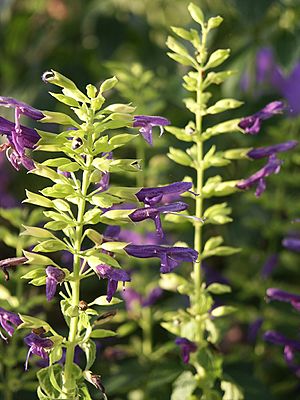Mexican sage facts for kids
Quick facts for kids Mexican sage |
|
|---|---|
 |
|
| Scientific classification |
|
| Kingdom: | Plantae |
| Clade: | Tracheophytes |
| Clade: | Angiosperms |
| Clade: | Eudicots |
| Clade: | Asterids |
| Order: | Lamiales |
| Family: | Lamiaceae |
| Genus: | Salvia |
| Species: |
S. mexicana
|
| Binomial name | |
| Salvia mexicana |
|
| Script error: The function "autoWithCaption" does not exist. | |
Script error: No such module "Check for conflicting parameters".
Salvia mexicana is also known as Mexican sage. It is a type of plant that grows like a small bush. This plant is native to a large area in central Mexico. You can find it growing at high places, from about 790 to 2,590 meters (2,600 to 8,500 feet) above sea level. It grows in warm, wet areas in the south and drier, warm areas in the north. Often, you can spot it at the edges of forests.
Contents
About Mexican Sage Plants
How Mexican Sage Looks
Mexican sage plants can grow quite tall. They usually reach about 1 to 3 meters (3 to 9 feet) in height. They also spread out, becoming about 1 to 1.2 meters (3 to 4 feet) wide. Their leaves can be different shades of green. Some are bright green and smooth, while others are grayish-green with short, soft hairs.
The flowers of the Mexican sage are also quite varied. They grow in long clusters called inflorescences. The size of these clusters and the individual flowers can differ. The flowers and the cups that hold them (called calyces) come in beautiful colors. These colors range from very dark purple to a bright purplish-blue.
When Mexican Sage Blooms
Mexican sage plants start to bloom in the late summer. They produce many flowers for several months. The flowers grow in groups that circle the stem, which are called whorls. This makes the plant look very full and colorful when it is blooming.
Popular Types of Mexican Sage
People started growing Salvia mexicana in gardens around the 1970s. It was first seen in several botanical gardens. One very popular type is called 'Limelight'. This plant has bright violet-blue flowers. It also has large, lime-green calyces, which are the parts that hold the flowers. The 'Limelight' type was found in the state of Querétaro in Mexico.
Other popular types are 'Lollie Jackson' and 'Ocampo'. 'Lollie Jackson' is a smaller, more compact plant. 'Ocampo' grows upright and can reach about 2 meters (7 feet) tall. You can often find both of these types for sale in plant nurseries.
See also
 In Spanish: Salvia mexicana para niños
In Spanish: Salvia mexicana para niños
 | Laphonza Butler |
 | Daisy Bates |
 | Elizabeth Piper Ensley |

